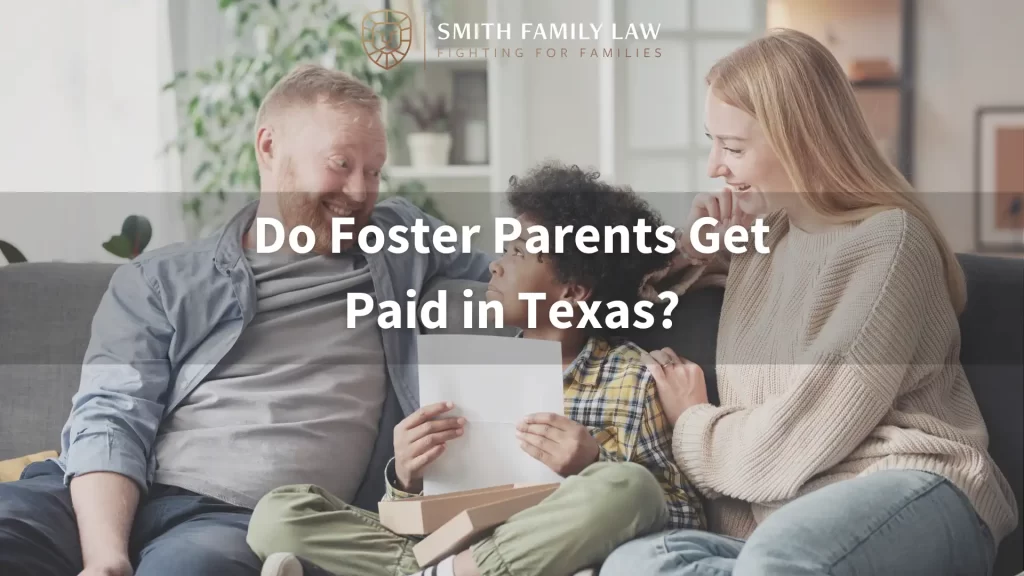
Many people in Texas consider becoming foster parents but have understandable concerns about the financial aspects of fostering and adopting. Do foster parents get paid in Texas? If so, how much? And what happens if you decide to adopt the child you’re fostering?
If You Adopt a Foster Child, Do You Still Get Paid?
In Texas, foster parents are reimbursed for most of the expenses related to raising a foster child. Reimbursement payments are based on the child’s specific needs.
The Department of Family and Protective Services (DFPS) uses a level of care (LOC) system to determine the daily reimbursement rate for each child. The more needs a child has, the higher their LOC and the higher the potential reimbursement for their foster parent(s).
Here’s a breakdown of the current daily reimbursement rates in Texas:
- Basic: $27.07
- Moderate: $47.37
- Specialized: $57.86
- Intense: $92.43
- Treatment Foster Care: $137.52
These payments are calculated based on the number of days a child stays in the home. Foster families receive these payments twice a month. On top of this, most children in foster care qualify for Medicaid, which covers medical and dental expenses.
However, once a foster child is adopted in Texas, the regular foster care payments usually stop. The state expects adoptive parents to take over full financial responsibility for their children.
Do You Get a Monthly Check When You Adopt a Child in Texas?
When you adopt a child in Texas, you do not automatically receive a monthly check like you do when you are a foster parent. The state stops the regular foster care payments once you finalize the adoption. This is because the state views adopting a child as creating a permanent family, where the adoptive parents assume total financial responsibility for the child’s needs.
However, in certain situations, adoptive families might qualify for post-adoption financial assistance. This assistance is typically available to families who adopt children with special needs or who have specific challenges that require ongoing support. The post-adoption assistance could include one-time reimbursements or a monthly stipend, but it depends on the individual circumstances of the adoption and the child’s needs.
To find out if you qualify for post-adoption assistance, you should seek advice from a Texas adoption attorney. They can provide you with the most accurate and up-to-date information available and help you plan for the financial aspects of adoption in Texas.
How Much Do Foster Parents Get Paid in Texas?
In Texas, foster parents receive a reimbursement to help cover the costs of raising a foster child. This payment is not a salary but a way to offset the expenses related to the child’s care. The reimbursement amount depends on the child’s specific needs, determined by their level of care under the DFPS system.
So, for example, if a child is at the Basic level, their foster family receives $27.07 for each day the child stays with them. They calculate and distribute foster family payments twice monthly. In our example involving a child with a basic level of care, a foster family that supported the child for 30 days would receive a total of $812.10.
Educational expenses are covered through the public school system, and foster children also have access to a free public college education. If you’re thinking of becoming a foster parent, a lawyer can help you understand these rates and potential reimbursements and plan for your financial future.
How Much Money Do You Get for Adopting a Special Needs Child?
When you adopt a special needs child in Texas, you might qualify for financial support through Title IV-E funded adoption assistance. To be eligible for this assistance, you must meet five requirements:
- The adoptive placement process requires confirmation of the child’s special needs before finalization.
- The state must have made reasonable efforts to place the child without adoption assistance unless doing so goes against the child’s best interests.
- DFPS or a private, licensed, non-profit agency must place the child.
- The child must be in an adoptive placement and qualify for Supplemental Security Income (SSI) or certain other public benefits or live with a minor parent in foster care.
- Finalization of the adoption is contingent upon the signing of the adoption assistance agreement.
In this context, a “special needs” child is one who is younger than 18 and meets at least one of the following criteria:
- They are six years old or older.
- They are at least two years old and belong to a racial or ethnic group that experiences slower adoption rates than others.
- Some children are finding new homes with their siblings, while others are becoming part of existing families.
- They have a confirmed physical, mental, or emotional disability.
The amount of money you can get for adopting a child with special needs varies depending on your adoptive child’s needs and your circumstances. If you’re considering adopting a special needs child in Texas, consult an attorney to understand your eligibility and the potential financial resources available.
How a Lawyer Can Guide You Through the Adoption Process in Texas
If you are considering or in the process of adopting a child in Texas, contact a knowledgeable lawyer as soon as possible. A Texas adoption lawyer can help you by:
- Evaluating your eligibility for adoption
- Preparing and reviewing all necessary paperwork
- Representing you in court hearings
- Addressing your questions and concerns about the adoption process
- Guiding you through home study requirements
- Calculating potential financial support if you foster a child
- Assisting with interstate or international adoption complications
- Coordinating with adoption agencies on your behalf
- Preparing you for court interviews or evaluations
- Advocating for your interests in adoption disputes
- Guiding you through the post-adoption subsidy application process
Get in Touch with a Texas Adoption Lawyer Today
If you’re considering foster care or adoption in Texas and have questions about financial support, don’t hesitate to reach out to Smith & Bledsoe Family Law. A family law attorney is ready to address any concerns or questions you might have. Contact us today or call (512) 277-3166 to arrange a free consultation. Your family’s future is important to us, and our team is here to guide you toward the most favorable outcome.
Related Reading:
